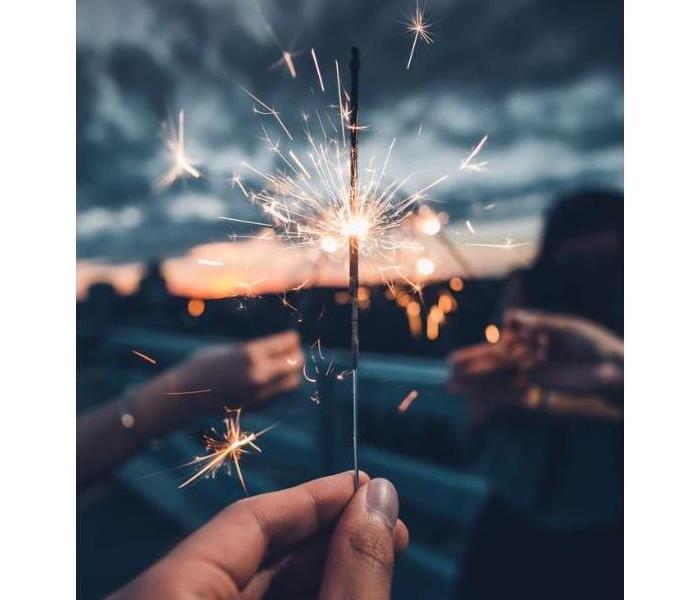Recent Fire Damage Posts
SERVPRO of North Kanawha Valley & Teays Valley's, Premier Fire Restoration Provider
11/28/2022 (Permalink)
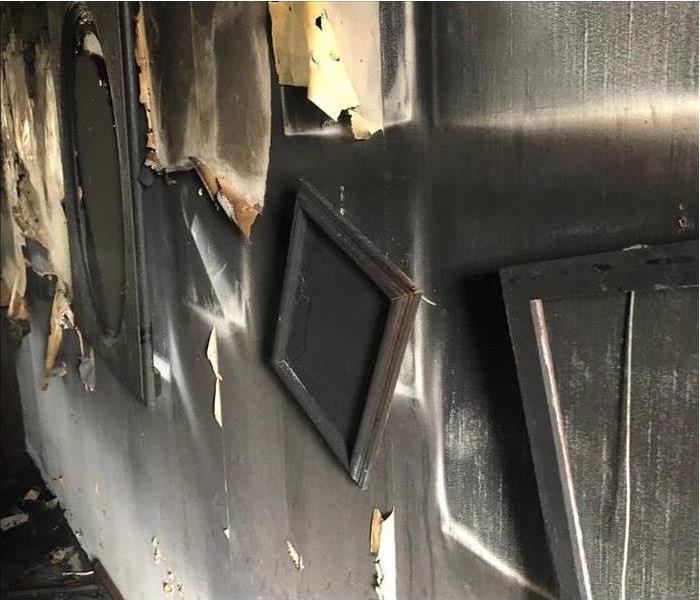 Apartment Fire
Apartment Fire
There have been several recent fires locally in the Kanawha - Putnam areas. It is a very emotional time as a homeowner or a business owner after a fire has occurred. Fear, uncertainty, stress and doubt about the future of the property can be overwhelming for the property or business owner. Fortunately, your local SERVPRO® of North Kanawha Valley & Teays Valley has been the premier fire restoration professionals serving this area for over 28 years.
The first 48 hours after a fire damage can make the difference between restoring versus replacing your property and belongings. SERVPRO® is available 24 hours/ 365 days a year to help you regain control quickly. Our 1-4-8 Service Response Guidelines can help prevent fire damage from creating long-term problems. SERVPRO® professionals provide mitigation services ranging from fire, smoke and soot removal to contents claim inventory and documentation restoration services.
What you can do until help arrives
· Limit movement in the home to prevent soot particles from spreading and additional damage from occurring.
· Place clean towels or old lines on rugs and high traffic areas and upholstery.
· Coat chrome faucets, trim, and appliances with petroleum jelly or oil.
· Place aluminum foil or wood blocks between furniture legs and wet carpet.
· Do not wash any walls or painted surfaces.
· Do not shampoo carpet or upholstery.
· Do not clean any electrical equipment.
· Do not send clothing to a dry cleaner since improper cleaning may set smoke odor.
Candle Safety
10/10/2022 (Permalink)
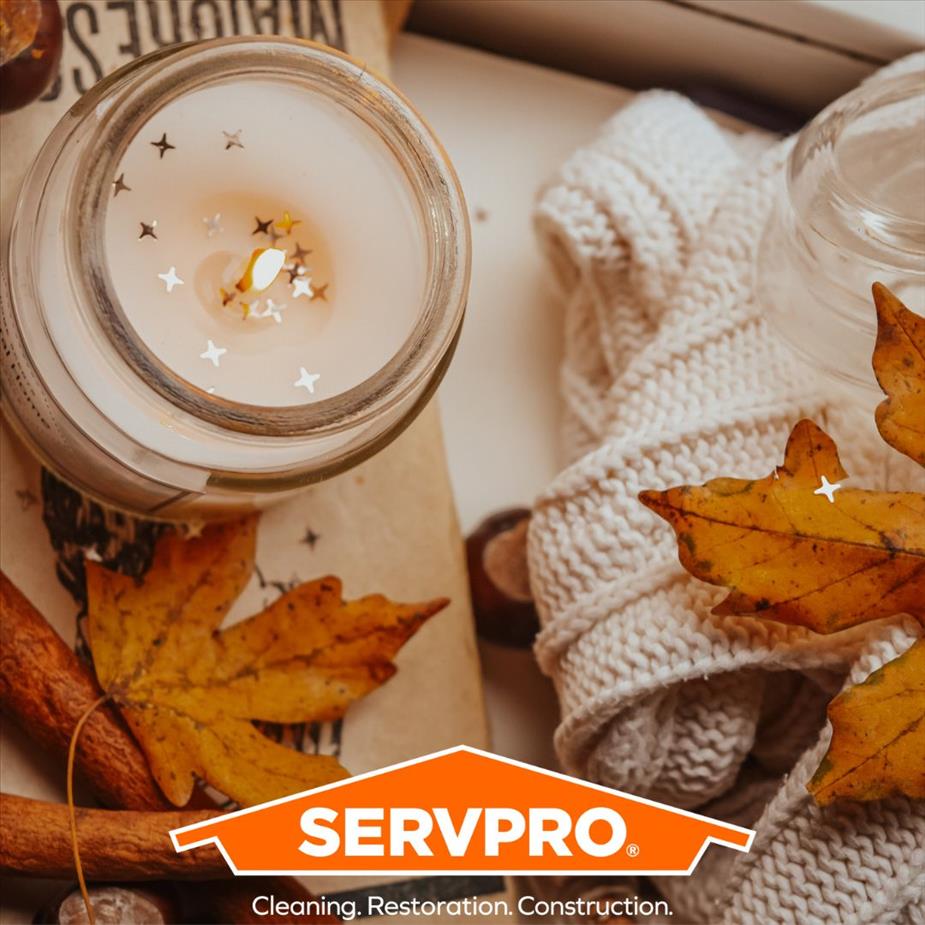 Candle and leaves with a SERVPRO logo
Candle and leaves with a SERVPRO logo
Spooky season is upon us, and we know how excited everyone is to carve pumpkins and decorate their homes. Here at SERVPRO we love a good pumpkin spice candle so here are a few fire safety tips to keep you safe this fall. Use caution when using candles. When using a candle never leave it unattended, and keep it in a spot away from curtains or furniture. Place your candle some where it won't easily be knocked over and always remember to trim the wick of your candle. Trimming the wick of your candle can keep the flame lower when you light the candle again. If you are using real candles in your jack-o-lanterns try to keep a safe distance from combustible items such as cornstalks and fabric.
Safety is the name; grilling is the game.
7/11/2022 (Permalink)
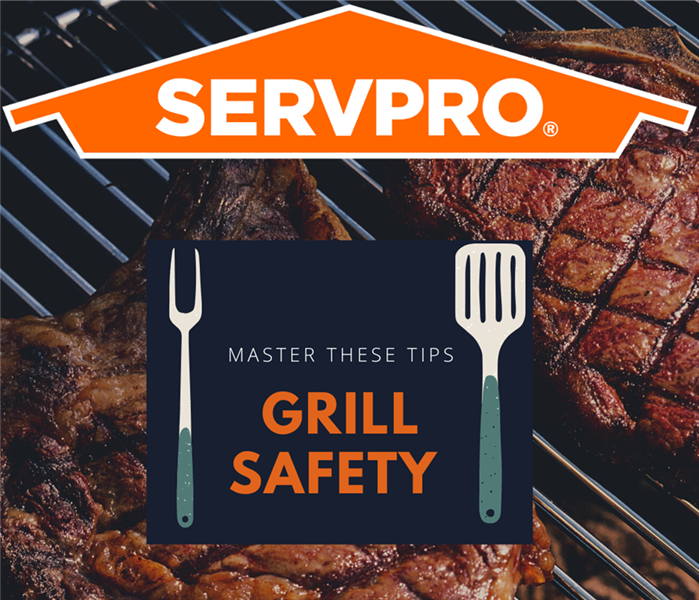 Grill Safety written over a back ground of steaks grilling
Grill Safety written over a back ground of steaks grilling
The smell of hot dogs and hamburgers on the grill; family spending time together; pool parties; music playing; all of these are things that make summer fantastic. If you are planning on having a family BBQ or even just grilling for yourself, it is a good idea to be aware of grill safety. While we, SERVPRO of North Kanawha Valley, would be happy to help if fire damage did occur, we would like to share some tips to help you out this summer season.
For the grill masters and BBQ legends:
- If you are using a grill, be sure that it isn’t defective in any way. Always check for propane leaks, and if you’re using charcoal, make sure there are no holes rusted into the grill.
- Always make sure your grill is on a flat surface. If it isn’t stable, it may fall, causing fire damage.
- When using a charcoal grill, let the starter fluid soak into the coals for a minute before igniting them to allow the explosive vapors time to dissipate.
- If you are grilling using an electric grill, never use lighter fluid or other combustible materials.
- Although a shady spot may seem nice to grill under, do not use grills close to the house or any other structures where they have the potential to catch on fire.
Fire Extinguishers: Have You Checked Yours?
7/1/2022 (Permalink)
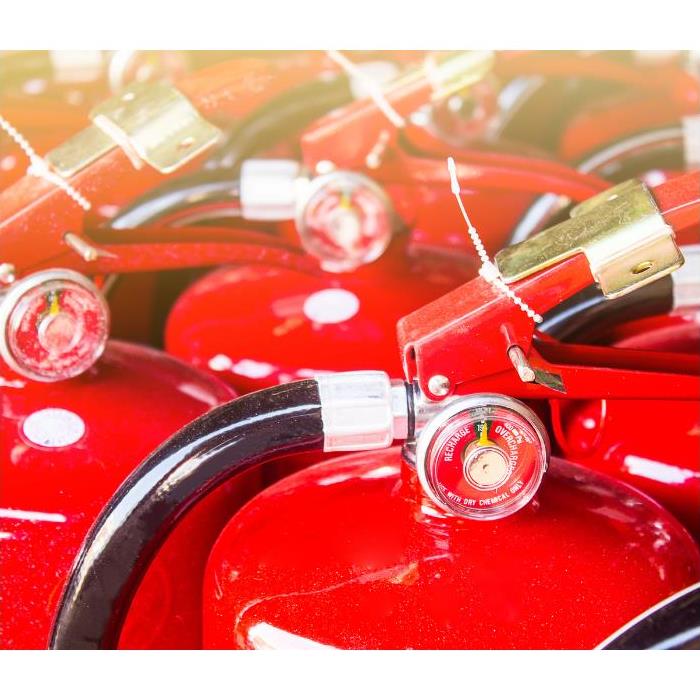 Red Fire extinguishers in a group
Red Fire extinguishers in a group
Have you checked your fire extinguisher? I know it’s a task that most people forget about, you get busy and never think to check it. While we are all hoping this situation never happens, it is important to ensure you are prepared. Here are some tips to make sure your extinguisher is fire ready just in case you need it.
- Check the date, how old is it? You will find an expiration date at the bottom of the label. If it is more than ten years old, it should be replaced or refilled. The pressure could be gone, or it simply could not work.
- Check the gauge to be sure it is pointing to the green area on the gauge.
- Does it have a UL listing on the label to verify that is certified?
- Make sure you know the location of your extinguisher in the home. Familiarize yourself with how to operate it as well.
To help you to remember, you can use the acronym P.A.S.S.
P-Pull Pin
A-Aim at the base of the fire
S-Squeeze trigger
S-Sweep from side to side
- If there is more than one person in the home, have one call 911 and the other use the extinguisher. If the fire has reached a stage other than the start of the fire, it is very important to GET OUT of your home or business and wait for the fire department.
Fireworks are fun; enjoy them safely!
6/3/2022 (Permalink)
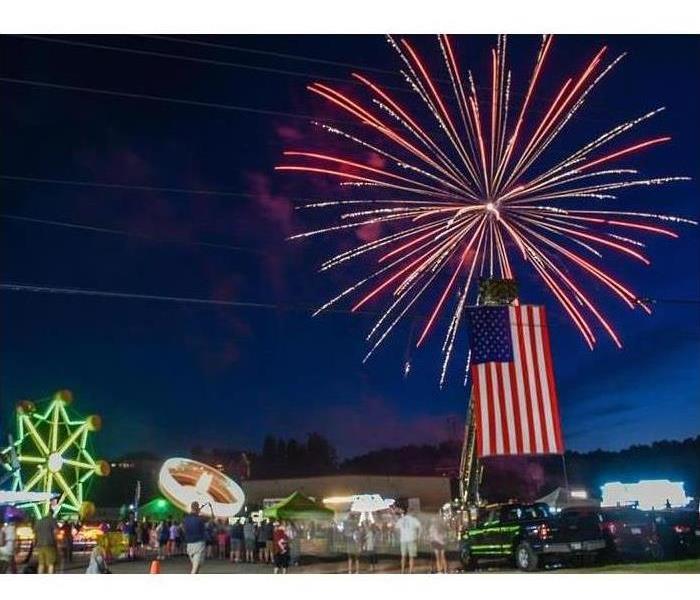 Enjoy fireworks at public displays conducted by professionals for a fun and safe July 4th!
Enjoy fireworks at public displays conducted by professionals for a fun and safe July 4th!
Summertime and the Fourth of July means fireworks. To quote the National Safety Council, "fireworks should be enjoyed at public displays conducted by professionals and should not be used at home." Although fireworks are legal, that does not mean that they are safe. And while we, SERVPRO of North Kanawha and Teays Valley, would take care of your home if a fireworks accident did occur leaving fire damage to your property, we would rather you and your family be safe.
IF you choose to use fireworks this Fourth of July, follow these safety tips to ensure that you and your community stay safe this holiday:
-Never hold a lit firework in your hand
-Never light fireworks inside
-Only use fireworks in an area clear of houses, vehicles and trees
-Keep a bucket of water nearby to extinguish any fires that may occur and to put out lit fireworks that do not go off
-Never re-light a firework that does not go off
Of course, if things don’t go to plan and your house gets hit by a rogue firework, give us a call. We’re available every day, 24/7, even on holidays such as the 4th!
Soot webs: what are they?
5/9/2022 (Permalink)
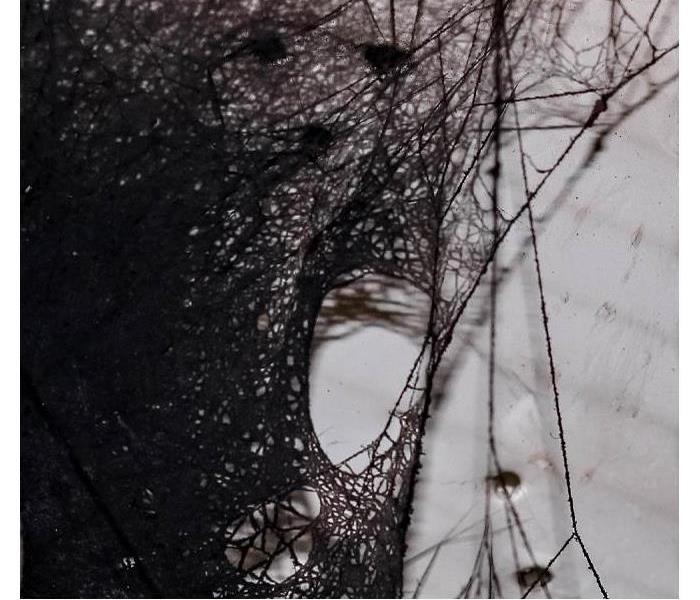 They aren't spider webs. These black webs are caused by soot after a fire occurs.
They aren't spider webs. These black webs are caused by soot after a fire occurs.
When we enter a home with fire damage, we see a lot of different things. Black dust on the tops of door frames and furniture, soot on AC registers and smoke damage on the ceilings. Something else very common we see is something called soot webs, or soot tags.
Soot webs are black 'cob web' looking things. Most of the time, a home owner will think that the soot has attached itself to all of the dust webs and cob webs in their home, and they always say "I did not realize my house was so dusty!" No fear, it is not dust.
Soot webs or tags form in areas of little circulation when synthetic or petroleum based sources burn. Soot particles follow the air into colder areas with lower circulation and concentrate in those areas. Since the soot occurs due to a combustion event, it makes the particles create long chains of soot. So do not worry! It is not dust or spider webs. It is just something fires leave behind, and is no issue for us to clean up.
If your home or business suffers from fire damage, give us a call. Soot webs, smoke damage, water damage from sprinklers. We will take care of your property from start to finish.
Contents Restoration
2/25/2022 (Permalink)
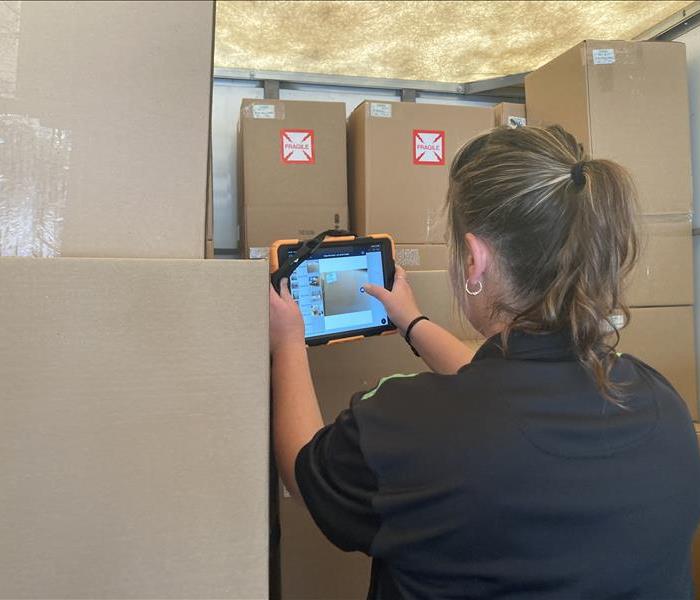 Our Contents Crew is taking inventory of a customer’s belongings before taking them to our warehouse to be stored.
Our Contents Crew is taking inventory of a customer’s belongings before taking them to our warehouse to be stored.
In 2021, we decided to add another essential service to our Cleaning and Restoration line: Contents. Although contents cleaning is something that has been a part of our overall restoration abilities, we knew it was time to dedicate more time and resources to enhance our customer’s experience. In preparation for our contents division, we converted our warehouse into a space where customers’ belongings can be stored safely and securely in a climate controlled environment. Our warehouse is also equipped with a modern security system to better protect our customer’s belongings while in our possession.
Let us share a bit about how our Contents Division works. Our Contents Coordinator oversees the process and works alongside the Contents Production Crew from beginning to end. They do a thorough and complete inventory of salvageable, as well as non-salvageable items. When an opportunity arises to assist a customer with their contents that have been affected by fire, water, mold, or any other type of disaster, our contents crew will neatly pack the customers valuables into boxes after doing an initial inspection and pre-cleaning onsite. The biggest benefit our team members use in this process is a QR code box sticker system. This system enables us to keep track of every belonging from the beginning, to the final move back, and placement in the proper area of the home. If a customer decides they need an item while in storage, our technicians can easily locate that item with our state of the art system. It also allows us to know exactly what room an item originated in.
After the initial pack up, the contents are then transported to our secure warehouse where they are cleaned and stored until the restoration process is complete. For certain items, the Omegasonic ultrasonic machine is used. This state of the art contents cleaning machine easily removes smoke residues, mold, water damage, heat scale, and rust. This cleaning system reduces the amount of unsalvageable items, and restores more of the customers valuable belongings back to original condition. Once the restoration process is finished, and any reconstruction on the home is completed, our contents crews will move the items back into the home and place them exactly where they belong.
The main focus of our Content Division is to assist our customers in ensuring the restoration of their possessions are handled with great care so they can enjoy them for many years to come. We are very happy to offer this much needed service to our wonderful customers.
Winter Fire Safety
11/29/2021 (Permalink)
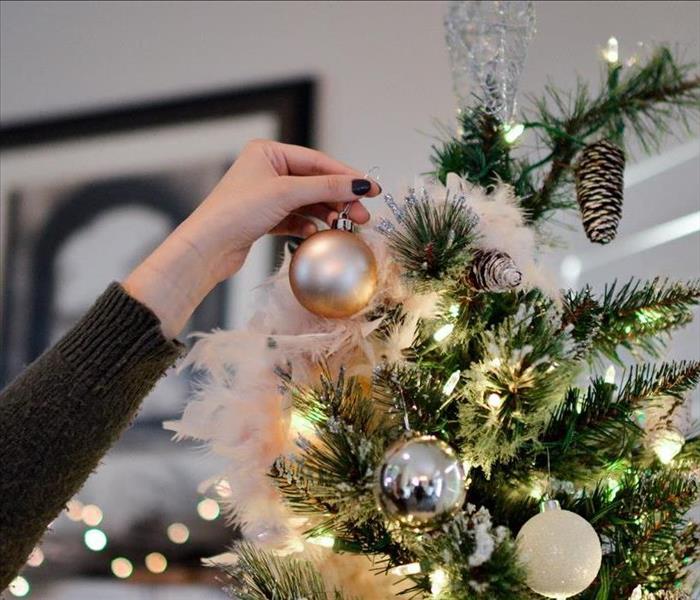 Keep yourself and your homes safe this winter season with these winter fire safety tips courtesy of your local SERVPRO.
Keep yourself and your homes safe this winter season with these winter fire safety tips courtesy of your local SERVPRO.
Winter is here and for West Virginia that means snowy tree branches and white mountain landscapes. The kids are excited to make snow angels and decorate the Christmas Tree and you are busy holiday shopping- all the things that make Winter one of the best times of year. We all know that with cold and snowy days comes the breaking out of our space heaters and firewood and with this comes an obvious fire hazard. Here is everything you need to know about Winter Fire Safety:
- Keep things that could catch fire at least three feet away from any space heaters or fireplaces
- Teach kids to stay at least three feet away from any open fires and space heaters
- Test your smoke alarms monthly
- Always turn portable heaters off when leaving the room or house and when going to bed
- Ensure you have a sturdy screen in front of your fireplace to keep sparks and embers from flying out of the fireplace and catching something on fire
- Never use an oven or stovetop to heat your home
More specifically, here are some fire safety tips for your Christmas Tree, since this is a leading cause of house fires during the holiday season:
- Pick a tree that has fresh, green needles
- Place the tree at least three feet away from any heat source
- Add water to the tree stand daily
- Always turn off Christmas tree lights before leaving home or going to bed
- Get rid of the tree when it starts becoming dry
Have a safe winter and a joyous holiday season everyone! If your home or business is affected by fire damage from a space heater or dried out Christmas tree, give us a call.
Our Construction Team
10/7/2021 (Permalink)
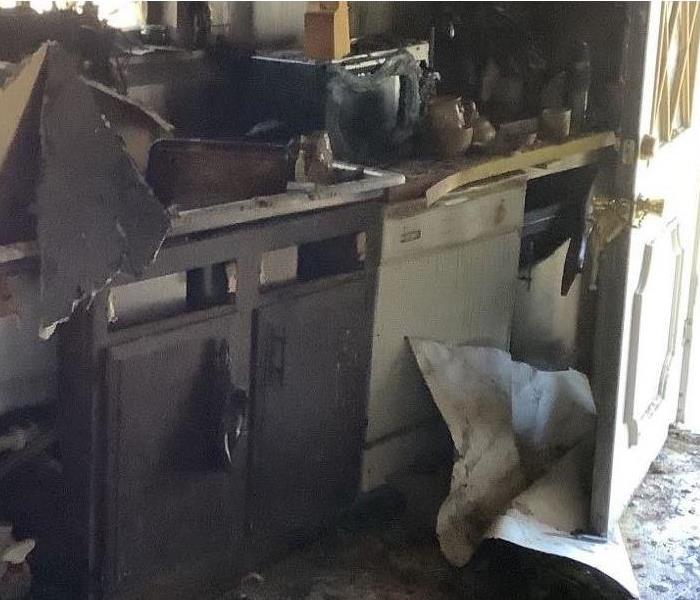 This kitchen damage was caused by a recent fire.
This kitchen damage was caused by a recent fire.
Not only does SERVPRO of North Kanawha and Teays Valley have trained production professionals that can tackle any job that comes to them, but we also have a skilled Construction Division. Our Construction Manager, Casey McFann, has been in the construction industry for 15 years and is a Certified Level II Proficient in Xactimate. Recently our team was sent to Belle, West Virginia to help with a heavy fire damaged house. The kitchen needed extensive demolition as well as surrounding rooms. With the help of our Mitigation Construction crews, we got the house restored. Included in the home's reconstruction was new electric, flooring, paint, bathroom vanities, kitchen cabinets and tile backsplash, and a floor to ceiling tile walk-in-shower. We were happy to help them after their loss. Our construction team at SERVPRO of North Kanawha and Teays Valley always makes sure that the SERVPRO standards are met. If you have any more questions about SERVPRO and the services we offer, give us a call.
Once the smoke clears, what's next?
7/20/2021 (Permalink)
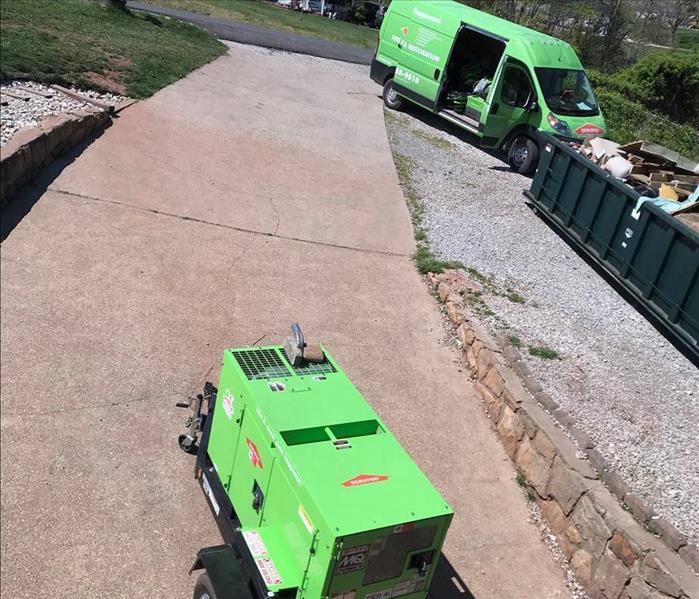 We have the equipment and training to make the fire damage "Like it never even happened."
We have the equipment and training to make the fire damage "Like it never even happened."
A fire in your home or business is something difficult to process and handle, emotionally, physically and financially. There are often so many "what if's" that run through your mind, but how do you figure out where to start once the fire is put out and the smoke clears. What is on your list of things to do? How quickly can you get your property restored to its original state? Since each smoke and fire damage situation is a little different, each one requires a unique solution tailored for the conditions present. SERVPRO® of North Kanawha and Teays Valley has been restoring homes and businesses in the Charleston area for over 30 years. We have the equipment, expertise, and experience to bring your property back to it's preloss state. We will also treat your family with empathy and respect and your property with care. With the many years of experience and our certified crews on call 24 hours a day, 7 days a week, all you need to know is SERVPRO of North Kanawha and Teays Valley will help make the damage “Like it never even happened.”
Have Questions about Fire, Smoke, or Soot Damage?
Call Us Today at 304-755-9510.
Making Fire Damage "Like it never even happened."
7/2/2021 (Permalink)
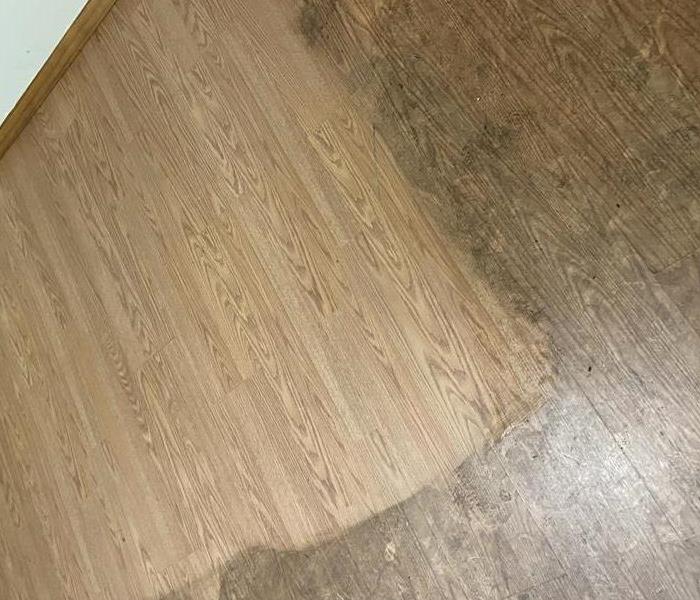 This before and after shows how well our method for cleaning fire damage works and makes it "Like it never even happened."
This before and after shows how well our method for cleaning fire damage works and makes it "Like it never even happened."
One of our new reps went on a fire job this past week to see what it's like out in the field and to get a well rounded knowledge of the business. One of our seasoned Crew Chiefs took the time to show him our cleaning process for heavy soot damage and it amazed him how well it worked. What was even more amazing is the method she used and demonstrated for him: the dry sponge. She explained to him that a dry sponge is the most effective way to clean heavy soot from surfaces. If you wet the surface and then dry it, it won't get all of the soot and it will make the stains set when it dries. When working with a dry sponge, it gets a bulk of the soot without causing more staining (of course, more severe cases will have to be painted after being cleaned). Attached is a video of our Crew Chief Brittany demonstrating how the dry sponge method works. To the right is a before and after picture from the same job.
We hope you learned something new!
Fireworks Safety
6/16/2021 (Permalink)
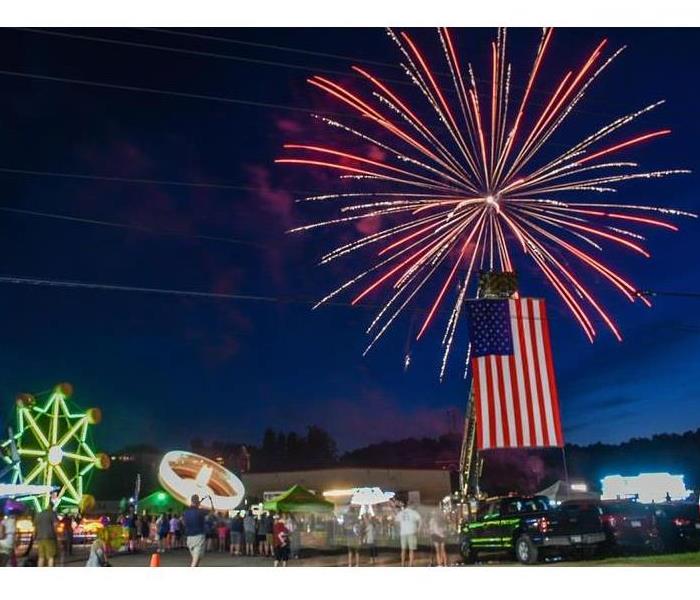 Enjoy fireworks at public displays conducted by professionals for a fun and safe July 4th!
Enjoy fireworks at public displays conducted by professionals for a fun and safe July 4th!
Summertime and the Fourth of July means fireworks. To quote the National Safety Council, fireworks should be enjoyed at public displays conducted by professionals and should not be used at home. Although fireworks are legal, that does not mean that they are safe. And while we, SERVPRO of North Kanawha and Teays Valley, would take care of your home if a fireworks accident did occur leaving fire damage to your property, we would rather you and your family be safe.
IF you choose to use fireworks this Fourth of July, follow these safety tips to ensure that you and your community stay safe this holiday:
-Never hold a lit firework in your hand
-Never light fireworks inside
-Only use fireworks in an area clear of houses, vehicles and trees
-Keep a bucket of water nearby to extinguish any fires that may occur and to put out lit fireworks that do not go off
-Never re-light a firework that does not go off
Of course, if things don’t go to plan and your house gets hit by a rogue firework, give us a call. We’re available every day, 24/7, even on holidays such as the 4th!
Greasy food is delicious, but sometimes it comes at a cost
2/19/2021 (Permalink)
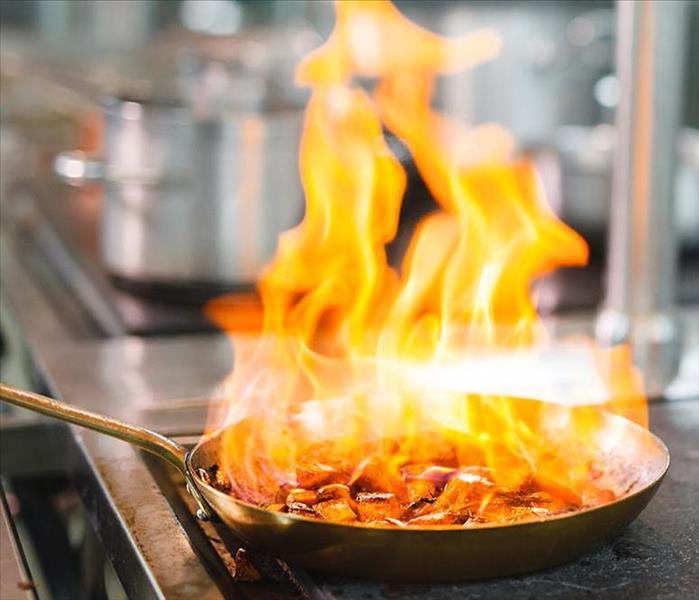 A grease fire in a commercial kitchen
A grease fire in a commercial kitchen
French fries, corn dogs, fried chicken- everything is better when it is fried to a golden brown. Of course, your waistline is not the only thing that could be affected when dealing with grease. Grease fires are a common culprit for initiating kitchen fires. It does not take much for a grease fire to become uncontrollable and end up out of hand. Here are some do’s and do not’s when it comes to cooking with hot oil to protect your home from a grease fire disaster.
Do:
- Remove any flammable objects from your cooking area before you start cooking.
- Monitor your cooking space the entire time. It only takes a second for a fire to ignite, especially a grease fire.
- Keep a metal lid and some baking soda nearby to smother the fire if one does ignite.
- Call 911 as soon as you notice you will not be able to handle the fire on your own. Evacuate the premises and call from a secure location.
Do not:
- Throw food into hot oil. This can cause the hot oil to splash and cause a grease fire. Place food in the hot oil gently, instead.
- Throw liquid of any kind onto a grease fire should one break out. This will cause the fire to grow and will not smother it.
- Move the pan or pot. The movement may cause the burning oil to splash and spread.
Of course, if the unfortunate thing occurs and your kitchen does end up having fire damage due to a grease fire, you know who to call. Our crews are always on standby and ready to clean up the aftermath of your culinary catastrophes.
Tis the Season
12/11/2020 (Permalink)
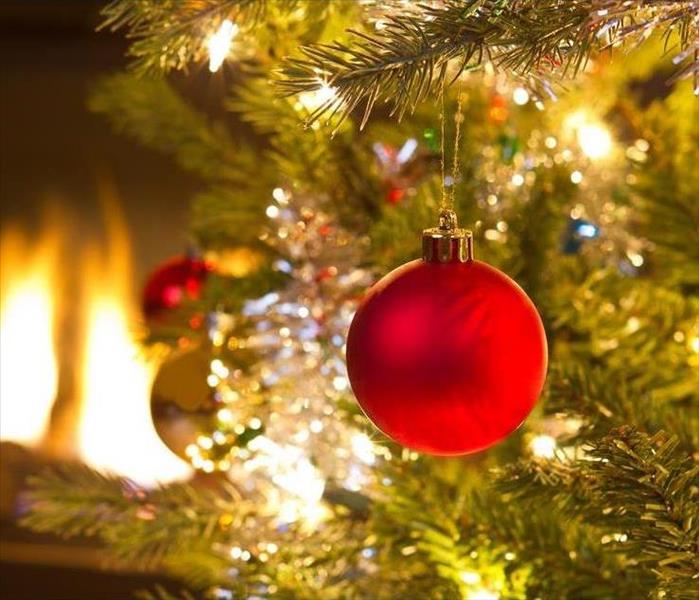 Christmas tree with fireplace behind
Christmas tree with fireplace behind
Tis the Season
It’s that time of year again. The stockings are hung by the chimney with care, but I sure hope that your Christmas tree isn’t over there. Did you know that one in four Christmas fires are caused by electrical problems, and another one in four is caused by a heat source too close to the tree? The National Fire Protection Association states that although Christmas tree fires are not common, when they do occur, they are more likely to be serious. With that in mind let’s take a moment to review some tips regarding your tree to make sure that your holidays stay merry and bright.
Picking the tree
- Choose a tree with fresh, green needles that do not fall off when touched.
Placing the tree
- Before placing the tree in the stand, cut 2” from the base of the trunk.
- Make sure the tree is at least three feet away from any heat source, like fireplaces, radiators, candles, heat vents or lights.
- Make sure the tree is not blocking an exit.
- Add water to the tree stand. Be sure to add water daily.
Lighting the tree
- Use lights that have the label of a recognized testing laboratory. Some lights are only for indoor or outdoor use.
- Replace any string of lights with worn or broken cords or loose bulb connections. Read manufacturer’s instructions for number of light strands to connect.
- Never use lit candles to decorate the tree.
- Always turn off Christmas tree lights before leaving home or going to bed
Some of these items may seem like common sense but a little bit of complacency mixed with the right amount of Grandpa’s eggnog and Santa might just show up to your house already looking like a lump of coal. So, this Holiday Season don’t be a Grinch. If you need help cleaning up after a fire, SERVPRO will be there in a cinch.
October is Fire Safety Month
10/12/2020 (Permalink)
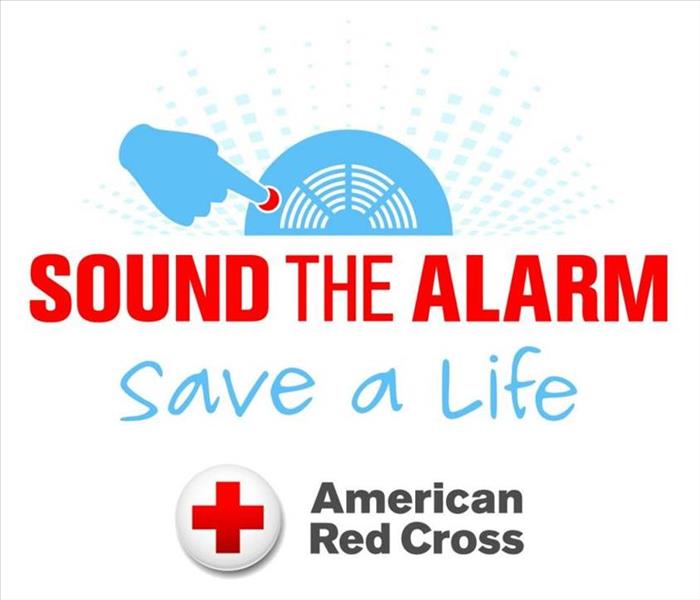 Red Cross Sound the Alarm
Red Cross Sound the Alarm
October is Fire Safety Month
According to the American Red Cross, there are 7 things you can do to help prepare your home for a fire.
https://www.redcross.org/get-help/how-to-prepare-for-emergencies/types-of-emergencies/fire/home-fire-preparedness.html
1 - Install the right number of smoke alarms. Test them once a month and replace the batteries at least once a year. Purchase smoke alarms here.
2 - Teach children what smoke alarms sound like and what to do when they hear one.
3 - Ensure that all household members know two ways to escape from every room of your home and know the family meeting spot outside of your home.
4 - Establish a family emergency communications plan and ensure that all household members know who to contact if they cannot find one another.
5 - Practice escaping from your home at least twice a year. Press the smoke alarm test button or yell “Fire“ to alert everyone that they must get out.
6 - Make sure everyone knows how to call 9-1-1.
7 - Teach household members to STOP, DROP and ROLL if their clothes should catch on fire.
We could not agree more with these tips and is glad the American Red Cross has a great program call Sound the alarm where they help; install free smoke alarms, share safety information, and fundraise to help families.
If you or your companies are looking for a cause that you can be involved in and know that directly saves lives, I would suggest this one. Join us as we "Sound The Alarm" with the American Red Cross.
https://www.redcross.org/sound-the-alarm.html
Fire Damage to Your Rental Home
7/6/2020 (Permalink)
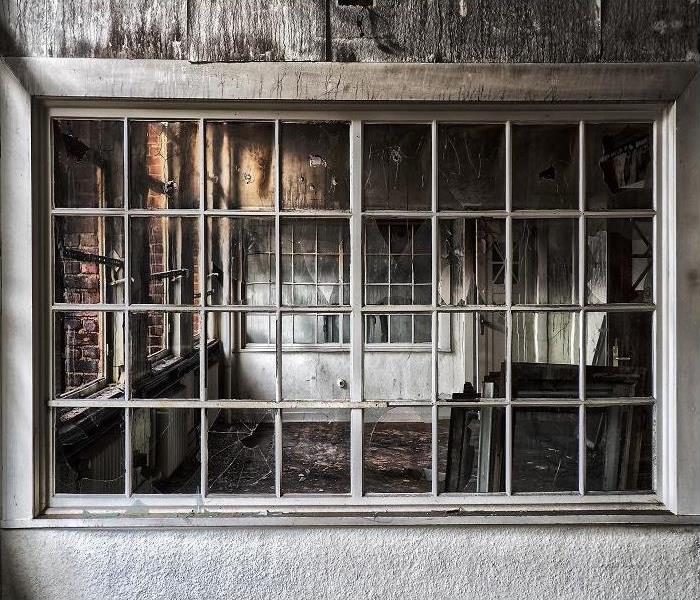 Home fires happen when we least expect them, make sure that you have home/renters insurance to protect your personal belongings.
Home fires happen when we least expect them, make sure that you have home/renters insurance to protect your personal belongings.
Renting a single family home, apartment or condo may be the way that you personally choose your housing. There are many perks that people really like about renting. The biggest perk is that you are not typically responsible for the major incidents that may occur within those four walls like an electrical fire, busted frozen water pipe, roof leak, or even when that 15 year old furnace decides it has served its purpose. While those are great perks, you still have the responsibility of your own personal property that may become damaged due to a number of issues that may arise while living in a home you personally do not own. Many renters mistakenly assume that their landlord's homeowner's policy will cover them if disaster strikes. I too felt that way at one point, until I ended up on the restoration side of the disaster. I thought, well if the homeowner/condo owner neglected issues like water pipes, electrical and even the roof. There is no way that their insurance wouldn't cover my personal property. How in the world could I be responsible for something I had nothing to do with? This was my personal theory until I began doing the work I do now.
I truly didn’t have a full understanding of how important that renters insurance was until I was working an apartment complex fire. The flames were contained to the one apartment, but that wasn't the biggest issue. It was the smoke and soot that affected nearly 20 apartments throughout 7 floors. The smoke and soot got into apartments on the other side of the building. Here's the thing, one smoke particle is half the size of bacteria, 1/8 the size of a red blood cell neither one of those are visible to the naked eye. Smoke and soot will find little pathways to follow holes around plumbing, and also find its way to your second floor or cooler parts of the home. So essentially we had to pretest every apartment within that building. A good majority of the condo renters didn't understand how they were going to have to pay for the smoke and soot cleanup within their apartments when it was a single condo that was the source of the smoke and soot.
Unfortunately, that was the case for quite a few people within that complex. They ended up having to attempt to clean their contents themselves, even when the owners of that condo were able to have their structure cleaned professionally. The cleaning of smoke and soot can be very tedious and time consuming even for professionals like SERVPRO of North Kanawha Valley & Teays Valley. Our technicians are trained and certified to identify and remediate smoke and soot properly.
There are four types of soot:
- Dry smoke residue: Powdery, dry small and non-smearing particles resulting from fires that burn quickly at a high heat
- Wet Smoke residue: Smearing, sticky and strong-smelling particles caused by fires that smolder at low temperatures, resulting in smoke webs that may be challenging to remove.
- Fuel oil soot: Dispersed by puff backs from furnaces
- Protein Residue: Very strong-smelling, but practically invisible residue that can ruin the color of varnish or paint.
Renters insurance is typically covered for a small monthly premium, the average renter’s policy has a $20,000 - $25,000 worth of coverage for your contents. There are even rider policies (Which is coverage for things that may be worth more than the per-item limit on your renter’s insurance policy). The value of your personal contents can add up quickly. The most important aspect of renters insurance is deciding whether to purchase replacement value or actual cost value coverage. While renters insurance is important for smoke and soot, it also covers many other things.
- Fire, lighting
- Windstorm, hail
- Explosions
- Riots
- Damage by aircraft
- Damage by vehicle (As long as it's not your own because you fell asleep in the driveway.)
- Damage from smoke
- Vandalism
- Theft
- Volcanic eruption (Hopefully not needed in the Kanawha and Putnam counties)
- Falling objects
- Weight of snow, ice, sleet
- Damage from steam- heating/water-heating appliances/systems
- Leakage or overflow from water or steam
- Freezing of plumbing, heating, air conditioning
- Short-circuit damage caused by electrical appliances.
Bottom line renters insurance is essential and relatively inexpensive so call your friendly insurance agent and get a quote.
All Up in Your Grill About Safty
7/6/2020 (Permalink)
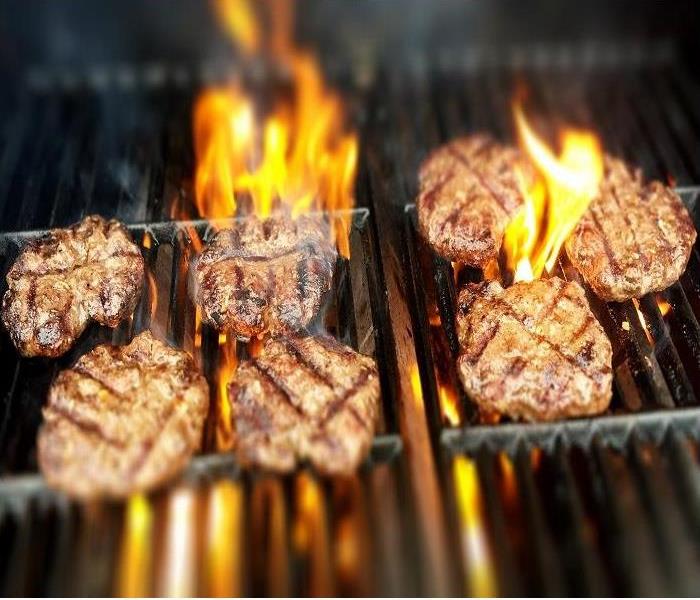 Whether you are using a propane grill, a charcoal grill, or a campfire, there are some basic safety guidelines.
Whether you are using a propane grill, a charcoal grill, or a campfire, there are some basic safety guidelines.
The crackling sound of a campfire, the smell of hot dogs on the grill, marshmallows turning into little fireballs on a skewer… all of these are things that make summer fantastic. If you are planning on spending summer indulging in one of these classic activities, it is a good idea to be aware of campfire/grill safety. Whether you are using a propane grill, a charcoal grill, or a campfire, there are some basic safety guidelines that the whole family should be educated on to protect themselves and their homes.
For the grillers:
- If you are using a grill be sure that it isn’t defective in any way.
- For propane, check the tank before use to make sure it isn’t damaged.
- When using a charcoal grill, let the starter fluid soak into the coals for a minute before igniting them to allow the explosive vapors time to dissipate.
- If you are grilling using an electric grill, never use lighter fluid or other combustible materials.
- Do not use grills close to the house where it has the potential to catch the structure on fire
For all of the campers and s’ mores connoisseurs out there, here are a few campfire safety tips that will help keep you, your families and our forests safe:
- Never build a campfire somewhere that it could easily spread. Steer clear of areas with large amounts of dead leaves and dry brush
- Do not keep flammables around the campfire. This includes lighter fluid and gasoline
- Keep the campfire to a size that is easy to control. Do not build one so large that it will get out of hand and spread
- Keep water or a shovel or both nearby so that the campfire can be extinguished if needed
- Keep tents and sleeping bags a safe distance from the fire
- Be sure that everyone at the campfire knows to stop, drop, and roll if an article of their clothing catches fire
- Extinguish correctly when leaving the fire (here is a great resource that demonstrates how to properly extinguish a fire https://www.smokeybear.com/en/prevention-how-tos/campfire-safety/how-to-maintain-and-extinguish-your-campfire)
Misconceptions of fire damage in your rental home
6/29/2020 (Permalink)
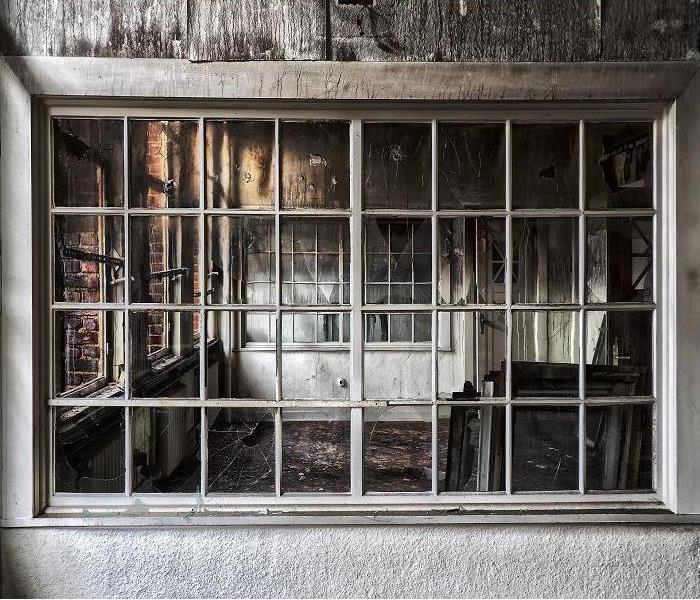 Home fires happen every 87seconds. Don't become a statistic.
Home fires happen every 87seconds. Don't become a statistic.
Renting a single-family home, apartment or condo may be the way that you personally choose your housing. There are many perks that people really like about renting. The biggest perk is that you are not typically responsible for the major incidents that may occur within those four walls like an electrical fire, busted frozen water pipe, roof leak, or even when that 15-year-old furnace decides it has served its purpose. While those are great perks, you still have the responsibility of your own personal property that may become damaged due to a number of issues that may arise while living in a home you personally do not own. Many renters mistakenly assume that their landlord's homeowner's policy will cover them if disaster strikes. I too felt that way at one point, until I ended up on the restoration side of the disaster. I thought, well if the homeowner/condo owner neglected issues like water pipes, electrical, and even the roof. There is no way that their insurance wouldn't cover my personal property. How in the world could I be responsible for something I had nothing to do with? This was my personal theory until I began doing the work I do now.
I truly didn’t have a full understanding of how important that renters insurance was until I was working an apartment complex fire. The flames were contained to the one apartment, but that wasn't the biggest issue. It was the smoke and soot that affected nearly 20 apartments throughout 7 floors. The smoke and soot got into apartments on the other side of the building. Here's the thing, one smoke particle is half the size of bacteria, 1/8 the size of a red blood cell neither one of those are visible to the naked eye. Smoke and soot will find little pathways to follow holes around plumbing, and also find its way to your second floor or cooler parts of the home. So essentially we had to pretest every apartment within that building. A good majority of the condo renters didn't understand how they were going to have to pay for the smoke and soot cleanup within their apartments when it was a single condo that was the source of the smoke and soot.
Unfortunately, that was the case for quite a few people within that complex. They ended up having to attempt to clean their contents themselves, even when the owners of that condo were able to have their structure cleaned professionally. The cleaning of smoke and soot can be very tedious and time-consuming even for professionals like SERVPRO of North Kanawha Valley & Teays Valley. Our technicians are trained and certified to identify and remediate smoke and soot properly.
There are four types of soot:
- Dry smoke residue: Powdery, dry small and non-smearing particles resulting from fires that burn quickly at a high heat
- Wet Smoke residue: Smearing, sticky and strong-smelling particles caused by fires that smolder at low temperatures, resulting in smoke webs that may be challenging to remove.
- Fuel oil soot: Dispersed by puff backs from furnaces
- Protein Residue: Very strong-smelling, but practically invisible residue that can ruin the color of varnish or paint.
Renters insurance is typically covered for a small monthly premium, the average renter’s policy has a $20,000 - $25,000 worth of coverage for your contents. There are even rider policies (Which is coverage for things that may be worth more than the per-item limit on your renter’s insurance policy). The value of your personal contents can add up quickly. The most important aspect of renters insurance is deciding whether to purchase replacement value or actual cost value coverage. While renters insurance is important for smoke and soot, it also covers many other things.
- Fire, lighting
- Windstorm, hail
- Explosions
- Riots
- Damage by aircraft
- Damage by vehicle (As long as it's not your own because you fell asleep in the driveway.)
- Damage from smoke
- Vandalism
- Theft
- Volcanic eruption (Hopefully not needed in the Kanawha and Putnam counties)
- Falling objects
- Weight of snow, ice, sleet
- Damage from steam- heating/water-heating appliances/systems
- Leakage or overflow from water or steam
- Freezing of plumbing, heating, air conditioning
- Short-circuit damage caused by electrical appliances.
Bottom line renters insurance is essential and relatively inexpensive so call your friendly insurance agent and get a quote.
Independence Day is approaching fast.
6/29/2020 (Permalink)
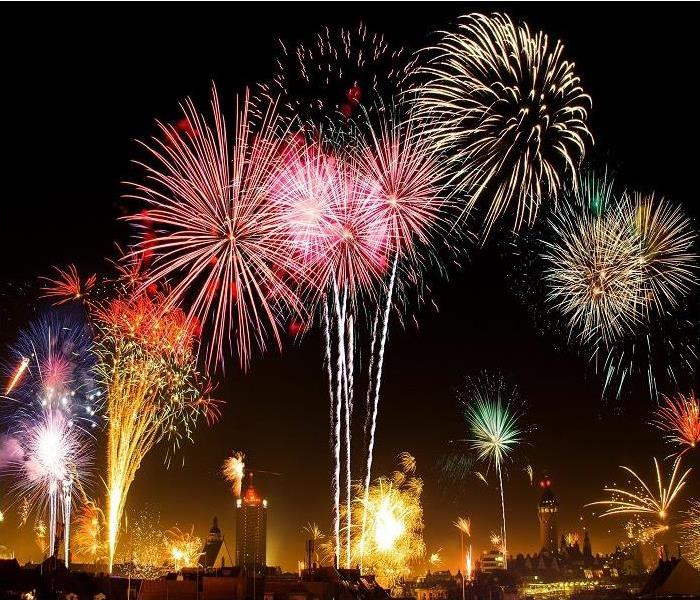 As independence day approaches quickly, always remember to make safety a priority.
As independence day approaches quickly, always remember to make safety a priority.
Independence Day is fast approaching. That comes with the chances of fire hazards, accidents, and injuries resulting from putting those fires out.
Follow these tips to make sure your fire extinguisher is ready, just in case something goes wrong.
When is the last time you checked your fire extinguisher?
How old is it? You will find an expiration date at the bottom of the label. If it is more than ten years old, it should be replaced. The pressure could be gone or it simply could not work.
Check the gauge to be sure it is pointing to the green area on the gauge.
Does it have a UL listing on the label to verify that it is certified and ready to go?
Once these questions have been verified, make sure you know the location of your extinguisher in the home. Familiarize yourself with how to operate it as well.
To help you to remember, you can use the acronym P.A.S.S.
P-Pull Pin
A-Aim at the base of the fire
S-Squeeze trigger
S-Sweep from side to side
If there is more than one person in the home, have one call 911 and the other use the extinguisher. If the fire has reached a stage other than the start of the fire, it is very important to GET OUT of your residence and wait for the fire department.
TIP: Never add water to put out a grease fire. It could cause an explosion or make the fire even bigger. Try to smother with a lid, pizza pan, or cookie sheet. Do not try to remove the pan from the stove. Turn the heat off and smother.
CELEBRATE OUR INDEPENDENCE BUT ABOVE ALL STAY SAFE.
Do you sleep with your bedroom door open or closed?
12/18/2019 (Permalink)
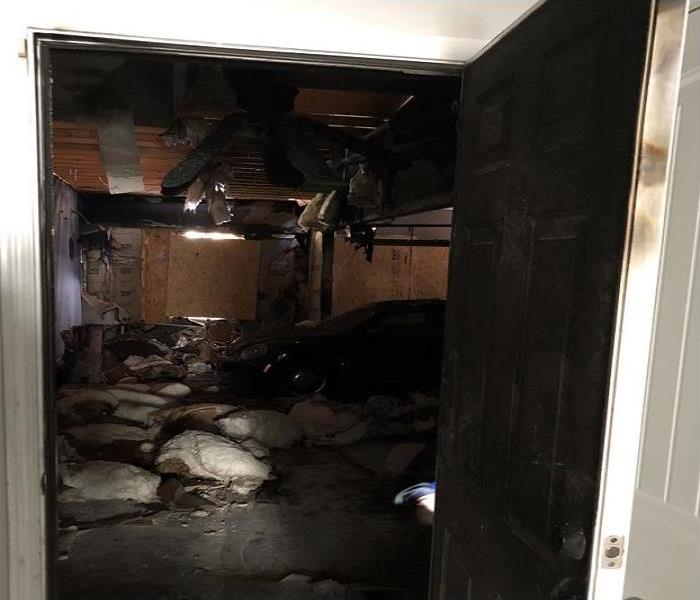 The door being closed during this house fire helped extremely reduce the amount of damage that this fire could have caused to this home.
The door being closed during this house fire helped extremely reduce the amount of damage that this fire could have caused to this home.
Your nightly routine can (and should) include brushing your teeth, washing your face, and getting into comfy PJ’s, but one step that is frequently missed is closing your bedroom door. Nearly 60% of people sleep with their bedroom doors open, according to the safety science organization UL. That simple choice could mean the difference between life and death in the event of a house fire. Most people sleep with the door open because they mistakenly believe that it is safer, but it is the exact opposite.
After more than a decade of research, it has been found that closing your door can slow fire spreading, reduce toxic smoke level, improve oxygen levels and decrease temperature. All of which increase survival. The temperature in a room during a house fire is significantly different when it comes to open verses closed bedroom doors. It is reported that the temperature of a room with a closed-door during a house fire is around 100 degrees, while if the door is left open during a house fire, the temperature can quickly climb to around 1000 degrees.
According to the NFPA (National Fire Protection Association) a house fire occurs somewhere in the United States every 88 seconds. The innovations in home furnishings, layouts, and construction over the last 40 years have reduced the average time to escape a home fire from 17 minutes to three minutes or less.
Check out this video from the National Fire Protection Association and watch how important closed doors are while you are sleeping.
#closebeforeyoudose
Endless Summer
10/10/2019 (Permalink)
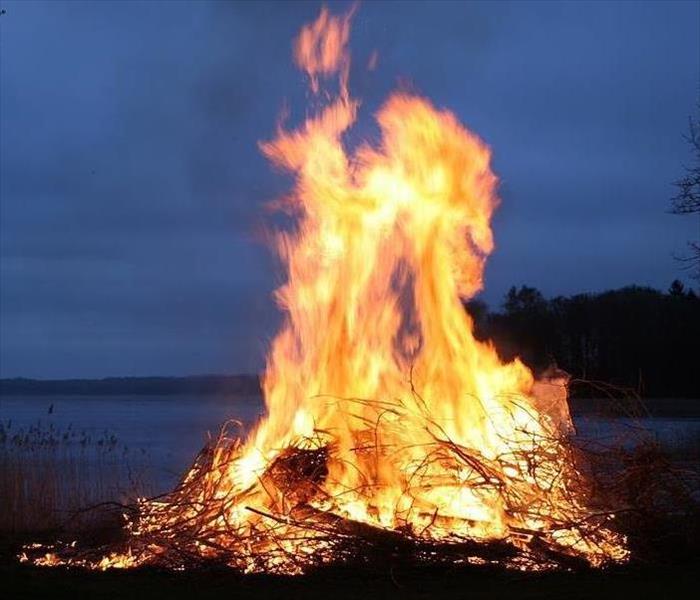 Large bonfire on the side of the lake.
Large bonfire on the side of the lake.
The other day someone said, “This is beautiful weather for July 71st.” It was intended as a little joke but in reality it is a very serious condition that we find ourselves in. As we flip our calendars to October we are generally thinking about jackets and pumpkin spice but this year has been an exception. This has been an unusually warm and dry late Summer and with that comes an increased risk of fire. As the leaves begin to fall at a more feverish pace, with no rain or cool weather to subdue their volatility, the danger of a catastrophic loss goes up exponentially. With that in mind, there are few ways to keep your family and business more protected during this endless summer.
Do not burn trash, leaves or brush outdoors.
When weather conditions produce the extreme threat of damage to life and property, the state can issue a burning ban to help reduce this risk. If the extreme weather persist the State can also place the area under a state of emergency that places stricter guidelines for burning and water usage. Debris burning can spark wild fires, as well as the fires that are intentionally started. Fire's spread fast in these types of conditions. So please heed the warnings.
Create a Safety Zone.
Maintain a 30-foot or greater safety zone around your home that is clear of brush, tall grass, and other flammable vegetation. Fire moves more quickly up steep hills so extend that fire safety zone if your home is situated on a steep slope.
Do not Park on Grass.
Do not park vehicles and other motorized equipment on dry grass or near shrubbery. Exhaust systems can far exceed the 500 degrees it takes to start a summer brush fire. If you need to pull off to the side of the road during a road trip, stay on the paved shoulder or find a nearby parking lot or rest stop.
Following these tips can help reduce the risk of a fire but in these conditions there is no full proof plan. We hope you never need us, but if do, SERVPRO of North Kanawha and Teays Valley has the manpower, experience and resources to make it like it never even happened.
P.A.S.S.
7/3/2019 (Permalink)
Independence Day is here. That comes with the chances of fire hazards, accidents, and injuries resulting from putting those fires out.
Ask yourself these questions and check the following to ensure that you and your fire extinguisher are ready, in case something happens to goes wrong.
When is the last time you checked your fire extinguisher?
How old is it? You will find an expiration date at the bottom of the label. If it is more than ten years old, it should be replaced. The pressure could be gone or it simply could not work.
Check the gauge to be sure it is pointing to the green area on the gauge.
Does it have a UL listing on the label to verify that it is certified and ready to go?
After you have verified that your fire extinguisher is in working order make sure you know the location of your extinguisher in the home. Familiarize yourself with how to operate it as well.
To help you to remember, you can use the acronym P.A.S.S.
- A-Aim at the base of the fire
- S-Sweep from side to side
If there is more than one person in the home, have one call 911 and the other use the extinguisher. A fire can quickly become unmanageable, it is important that you leave the house as soon as possible.
TIP: Never add water to put out a grease fire. It could cause an explosion or make the fire even bigger. Try to smother with a lid, pizza pan or cookie sheet. Do not try to remove the pan from the stove. Turn the heat off and smother.
CELEBRATE OUR INDEPENDENCE BUT ABOVE ALL STAY SAFE.
DON'T WAIT!
6/28/2019 (Permalink)
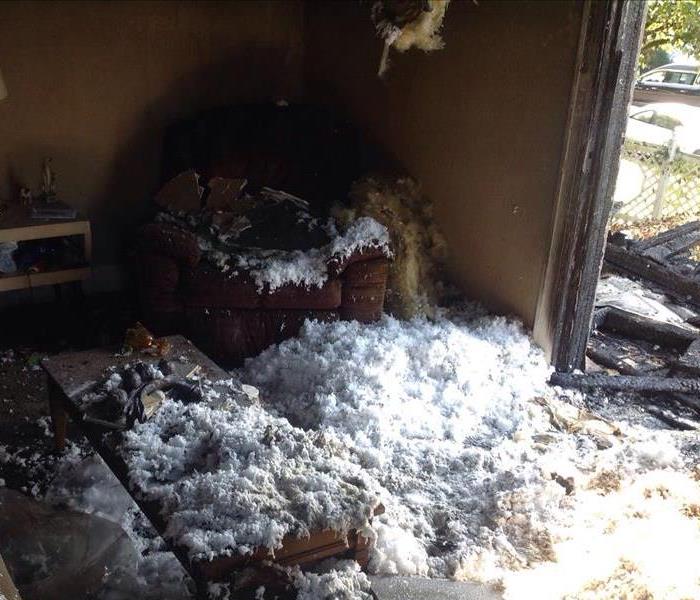 Residential fire in Kanawha County.
Residential fire in Kanawha County.
A house fire can be one of the most challenging things to have to process. No matter how big or small the fire damage may be, it is overwhelming. It is important to contact a professional to handle your fire damage. It is always our goal to try and save your belongings verses have to have them all replaced causing a tremendous amount of stress and cost. There a number of things that can help minimize the stress, as well as the cost during the process of returning your home back to preloss conditions. SERVPRO® of North Kanawha Valley and Teays Valley are here to help with a few helpful tips.
Saving Fire Damaged Possessions
Fire damaged property that may look like it needs to be replaced may actually be recoverable. SERVPRO® of North Kanawha Valley and Teays Valley can save many of your heirlooms. But act quickly. Prompt fire cleanup and restoration are important because the items found in your home—heirlooms, photos, collectibles, furniture, carpet, walls, drapes, and even ceilings—can absorb smoke. If too much time lapses between when the fire damage initially occurs and when fire cleanup occurs, the effects of smoke damage can last for months.
Time Can Cost You Many Possessions
The more time between the fire and restoration the more costs you incur and the fewer items you can restore. Depending on the extent of the fire damage, you may be able to save clothing, leather, books, photographs, kitchen items, furniture, and more.
Restored To Pre-Loss Condition
SERVPRO® of North Kanawha Valley and Teays Valley cleans and deodorizes restorable items, sometimes to preloss condition. So don’t throw anything out until you’re certain it must be replaced. By saving your property and you save money. Now that’s a win/win!
Call SERVPRO® of North Kanawha Valley and Teays Valley to discuss how we can help to get you back into your home as quickly as possible. Locally owned and operated in Nitro, WV we are able to help you with all of your Fire and Water restoration needs. Whether you are in centrally in the Kanawha and Putnam county areas or in the neighboring counties. We are here to help. Call today 304-755-9510.
Misconceptions of renters insurance
6/27/2019 (Permalink)
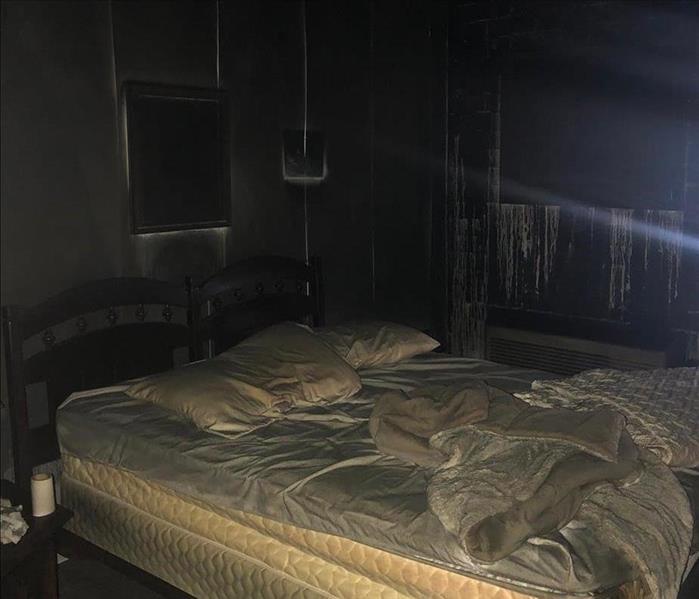 https://closeyourdoor.org/
https://closeyourdoor.org/
Misconceptions of fire damage in your rental home
Renting a single family home, apartment or condo may be the way that you personally choose your housing. There are many perks that people really like about renting. The biggest perk is that you are not typically responsible for the major incidents that may occur within those four walls like an electrical fire, busted frozen water pipe, roof leak, or even when that 15 year old furnace decides it has served its purpose. While those are great perks, you still have the responsibility of your own personal property that may become damaged due to a number of issues that may arise while living in a home you personally do not own. Many renters mistakenly assume that their landlord's homeowner's policy will cover them if disaster strikes. I too felt that way at one point, until I ended up on the restoration side of the disaster. I thought, well if the homeowner/condo owner neglected issues like water pipes, electrical and even the roof. There is no way that their insurance wouldn't cover my personal property. How in the world could I be responsible for something I had nothing to do with? This was my personal theory until I began doing the work I do now.
I truly didn’t have a full understanding of how important that renters insurance was until I was working an apartment complex fire. The flames were contained to the one apartment, but that wasn't the biggest issue. It was the smoke and soot that affected nearly 20 apartments throughout 7 floors. The smoke and soot got into apartments on the other side of the building. Here's the thing, one smoke particle is half the size of bacteria, 1/8 the size of a red blood cell neither one of those are visible to the naked eye. Smoke and soot will find little pathways to follow holes around plumbing, and also find its way to your second floor or cooler parts of the home. So essentially we had to pretest every apartment within that building. A good majority of the condo renters didn't understand how they were going to have to pay for the smoke and soot cleanup within their apartments when it was a single condo that was the source of the smoke and soot.
Unfortunately, that was the case for quite a few people within that complex. They ended up having to attempt to clean their contents themselves, even when the owners of that condo were able to have their structure cleaned professionally. The cleaning of smoke and soot can be very tedious and time consuming even for professionals like SERVPRO of North Kanawha Valley & Teays Valley. Our technicians are trained and certified to identify and remediate smoke and soot properly.
There are four types of soot:
- Dry smoke residue: Powdery, dry small and non-smearing particles resulting from fires that burn quickly at a high heat
- Wet Smoke residue: Smearing, sticky and strong-smelling particles caused by fires that smolder at low temperatures, resulting in smoke webs that may be challenging to remove.
- Fuel oil soot: Dispersed by puff backs from furnaces
- Protein Residue: Very strong-smelling, but practically invisible residue that can ruin the color of varnish or paint.
Renters insurance is typically covered for a small monthly premium, the average renter’s policy has a $20,000 - $25,000 worth of coverage for your contents. There are even rider policies (Which is coverage for things that may be worth more than the per-item limit on your renter’s insurance policy). The value of your personal contents can add up quickly. The most important aspect of renters insurance is deciding whether to purchase replacement value or actual cost value coverage. While renters insurance is important for smoke and soot, it also covers many other things.
- Fire, lighting
- Windstorm, hail
- Explosions
- Riots
- Damage by aircraft
- Damage by vehicle (As long as it's not your own because you fell asleep in the driveway.)
- Damage from smoke
- Vandalism
- Theft
- Volcanic eruption (Hopefully not needed in the Kanawha and Putnam counties)
- Falling objects
- Weight of snow, ice, sleet
- Damage from steam- heating/water-heating appliances/systems
- Leakage or overflow from water or steam
- Freezing of plumbing, heating, air conditioning
- Short-circuit damage caused by electrical appliances.
Bottom line renters insurance is essential and relatively inexpensive so call you friendly insurance agent and get a
All up in your grill about safety!
6/18/2019 (Permalink)
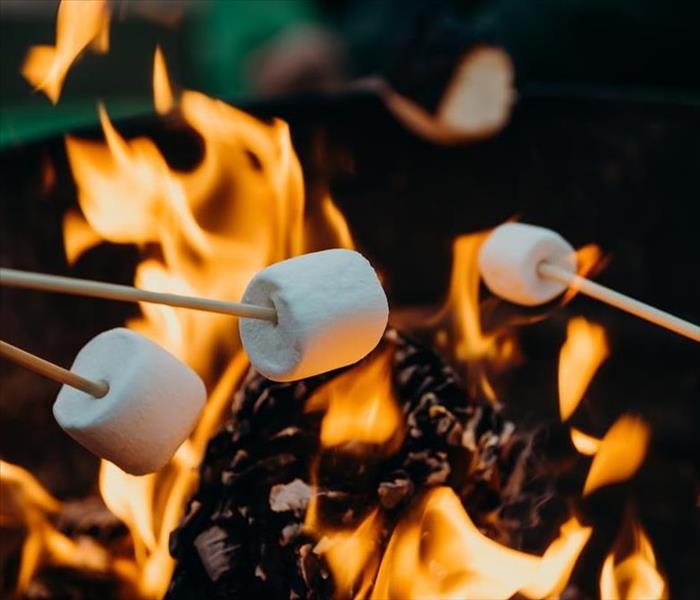 Back yard campfire
Back yard campfire
All Up in Your Grill About Safety
The crackling sound of a campfire, the smell of hot dogs on the grill, marshmallows turning into little fireballs on a skewer… all of these are things that make summer fantastic. If you are planning on spending summer indulging in one of these classic activities, it is a good idea to be aware of campfire/grill safety. Whether you are using a propane grill, a charcoal grill or a campfire, there are some basic safety guidelines that the whole family should be educated on to protect themselves and their homes.
For the grillers (that’s you, dad):
- If you are using a grill be sure that it isn’t defective in any way.
- For propane, check the tank before use to make sure it isn’t damaged.
- When using a charcoal grill, let the starter fluid soak into the coals for a minute before igniting them to allow the explosive vapors time to dissipate.
- If you are grilling using an electric grill, never use lighter fluid or other combustible materials.
- Do not use grills close to the house where it has the potential to catch the structure on fire
For all of the campers and s’mores connoisseurs out there, here are a few campfire safety tips that will help keep you, your families and our forests safe:
- Never build a campfire somewhere that it could easily spread. Steer clear of areas with large amounts of dead leaves and dry brush
- Do not keep flammables around the campfire. This includes lighter fluid and gasoline
- Keep the campfire to a size that is easy to control. Do not build one so large that it will get out of hand and spread
- Keep water or a shovel or both nearby so that the campfire can be extinguished if needed
- Keep tents and sleeping bags a safe distance from the fire
- Be sure that everyone at the campfire knows to stop, drop, and roll if an article of their clothing catches fire
- Extinguish correctly when leaving the fire (here is a great resource that demonstrates how to properly extinguish a fire https://www.smokeybear.com/en/prevention-how-tos/campfire-safety/how-to-maintain-and-extinguish-your-campfire)
Saving lives one home at a time.
5/29/2018 (Permalink)
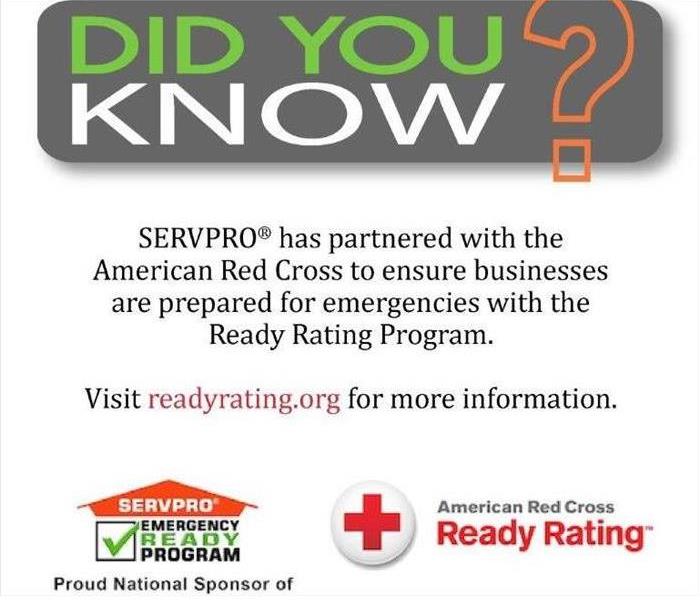 readyrating.org
readyrating.org
Saving Lives One Home at a Time
This fall, Red Cross volunteers and our partners will install 100,000 free smoke alarms in high risk neighborhoods nationwide. Sound the Alarm installation and fire safety events will take place in more than 100 communities across the country, providing a lifesaving service in our quest to reduce death and injury from home fires.
Every day, seven people die in home fires. Most, in homes that lack working smoke alarms. Sadly, children and the elderly disproportionately lose their lives. That’s why the Red Cross rallied an army of volunteers and launched our Home Fire Campaign in 2014. Since then, they've accomplished so much.
Each year, the Red Cross responds to nearly 64,000 disasters, the vast majority of which are home fires. So we set a goal to reduce fire-related deaths and injuries in the US by 25% by 2020.
If you or your companies are looking for a cause that you can be involved in and know that directly saves lives, I would suggest this one. Join us as we "Sound The Alarm" with the American Red Cross.
Holy Smoke! Charleston, WV
11/17/2016 (Permalink)
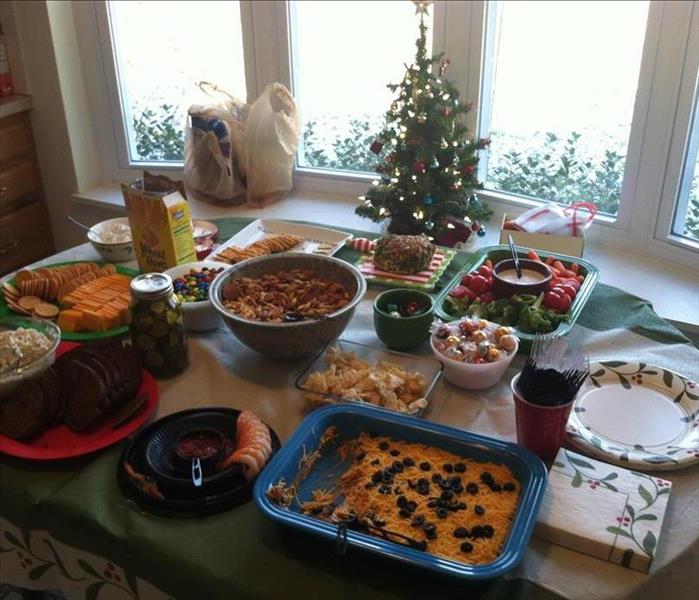 Cooking fires are on the rise during the holidays
Cooking fires are on the rise during the holidays
The holidays are approaching and many families are finalizing plans for elaborate meals, get-togethers with friends, and decorating with festive lights. Amidst all this planning, SERVPRO of North Kanawha Valley reminds homeowners that they may be overlooking the most important plan they can make—a fire safety plan.
Each year, statistics1 show the incidence of home cooking and candle fires peaks during the holiday season. This tends to focus homeowners on fire prevention precautions—and that’s a good thing, But to truly protect your family from the dangers of a home fire, at the holidays and throughout the year, you need to start with a fire safety plan. Developing a fire safety plan and practicing it regularly with your family is the most important step you can take to help prevent a house fire from turning into a devastating tragedy.
SERVPRO is a national leader and provider of fire and water cleanup and restoration services, and their disaster response professionals know from experience how devastating a home fire can be. They also know that when fire causes a loss of life, there is no “remediation” possible. This is why SERVPRO has teamed up with the American Red Cross by supporting the ARC Disaster Responder2 program, and in particular the Home Fire Preparedness Campaign3. As a Disaster Responder, SERVPRO pledges dollars and support in advance to help the ARC develop and distribute educational materials and respond immediately when they are needed.
We at SERVPRO encourage all Charleston area homeowners to follow these fire safety guidelines, developed by the ARC through their Home Fire Preparedness Campaign, to help minimize injury or loss of life due to a residential fire.
- Install the right number of smoke alarms4. Test them once a month and replace the batteries at least once a year.
- Teach children what smoke alarms sound like5 and what to do when they hear one.
- Ensure that all household members know two ways to escape6 from every room of your home and know the family meeting spot outside of your home.
- Establish a family emergency communications plan and ensure all household members know who to contact if they cannot find one another.
- Practice escaping from your home at least twice a year. Press the smoke alarm test button or yell “Fire” to alert everyone they must get out.
- Make sure everyone knows how to call 9-1-1.
- Teach household members to STOP, DROP and ROLL if their clothes should catch on fire.
Fire prevention and fire safety planning are two very different things. Fire prevention planning helps control or eliminate the causes of a fire. Fire safety planning helps prevent injury and loss of life when a fire does break out. To protect your family and your property, you need both.
For more fire prevention and fire safety tips and information about fire and water damage restoration services, please visit http://www.SERVPROnorthkanawhavalley.com/ .For more information on SERVPRO of North Kanawha Valley please contact us at 304-755-9510, or email us at office@SERVPRO9835.com
1 http://www.nfpa.org/public-education/by-topic/top-causes-of-fire/
2 http://www.redcross.org/donations/companies-and-foundations/giving-opportunities/SERVPRO
3 http://www.redcross.org/get-help/prepare-for-emergencies/types-of-emergencies/fire/home-fire-preparedness
4 http://www.redcross.org/get-help/prepare-for-emergencies/types-of-emergencies/fire/fire-safety-equipment#Smoke-Alarms
5 https://youtu.be/YH5YNkzl1dI
6http://www.redcross.org/images/MEDIA_CustomProductCatalog/m38640160_Home_Fire_Escape_Plan.pdf
Twas The Night Before Christmas
12/14/2015 (Permalink)
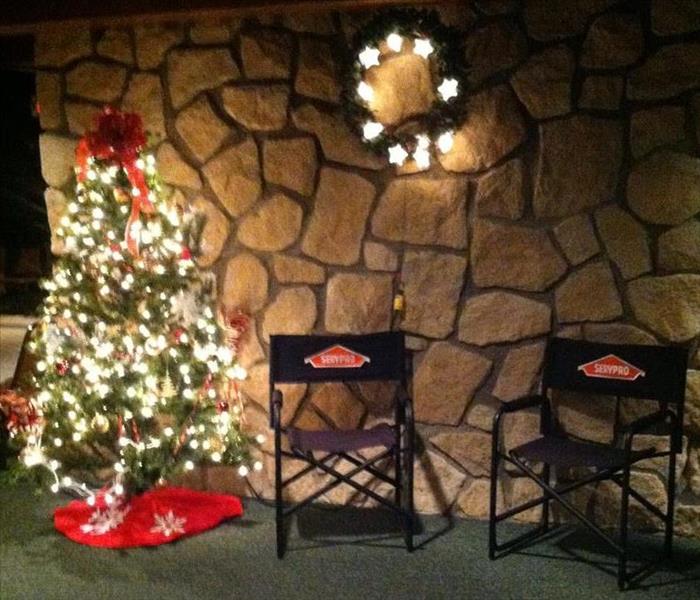 Holiday Fire Safety
Holiday Fire Safety
http://www.redcross.org/images/MEDIA_CustomProductCatalog/m4340080_FireHolidayFactSheet.pdf"Twas the night before Christmas, when all through the house not a creature was stirring, not even a mouse. The stockings were hung by the chimney with care, in hopes that St. Nicholas soon would be there. The children were nestled all snug in their beds, while visions of sugar plums danced in their heads…”
We all know this classic holiday poem by Clement Clarke Moore, but did you know that the number of home fires the American Red Cross has responded to has risen 10% since 2000? With the holidays coming up, let SERVPRO and the American Red Cross help make sure you are prepared with these additional Holiday Home Fires Facts.
Charleston, WV Apartment Building Fire
8/6/2015 (Permalink)
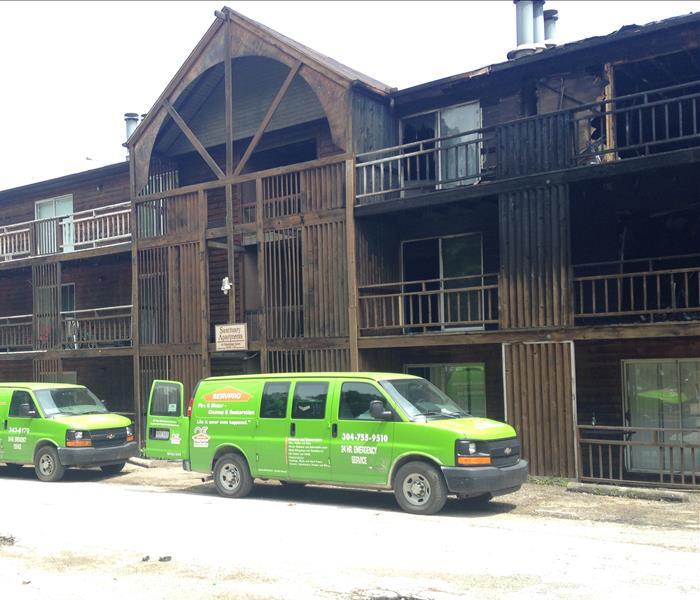 Sanctuary Apartments in Charleston, WV
Sanctuary Apartments in Charleston, WV
http://www.wsaz.com/home/headlines/Nine-Families-Displaced-After-Charleston-Apartment-Fire-318579121.html
SERVPRO is actively cleaning and restoring these Charleston, WV apartments. Thankfully there were no injuries or fatalities thanks to the some quick thinking tenants and the fast response of local firefighters.

 24/7 Emergency Service
24/7 Emergency Service





















